Here is a statement I posted on Facebook in July of 2014, and the debate which followed. I know that most who read this will think that I was only trying to provoke an argument; that I was being insolent; that I was in the flesh; that I was trying to get a reaction out of someone, etc., etc.. I am very familiar with that kind of sentiment.
What those who feel this way fail to understand is that we are cursed today, in our churches, with a crisis of knowledge. With few exceptions we do not know what knowledge is, nor do we know where it comes from. The Evangelical church has invented a distinction between knowledge and the mind of God as expressed in the Scriptures. When a theologian makes a statement about God, the pietist says “That’s just knowledge. We don’t need knowledge, we need God’s wisdom.” It is said that there are two kinds of knowledge: intellectual and spiritual. This kind of thinking is foreign to  the historical church. Confusion about knowledge – and Scripture itself – is rampant in the Evangelical church today. I posted this statement to provoke other believers toward a more robust faith, and a deeper understanding of God’s inerrant Word written to us, His people.
the historical church. Confusion about knowledge – and Scripture itself – is rampant in the Evangelical church today. I posted this statement to provoke other believers toward a more robust faith, and a deeper understanding of God’s inerrant Word written to us, His people.
Today we face a very grave threat. Islamic murderers are slaughtering believers at an unprecedented rate. Christians are being burned alive, decapitated, or tortured to death by the thousands upon thousands. It would seem that the persecution of the last days has begun. The days are growing darker by the hour, and there is only one Light, the Lord Jesus Christ. He is the Light that has given light to every man who enters the world. That means that He has implanted His own Logic into the souls of every person (D.A. Carson is wrong on this point). By this holy rationality, possessed by every human being, man knows that his deeds are evil, and knows what righteousness is. Every man knows God and hates Him, running helter skelter to the burning fires of hell. Only the elect will be saved, and not because they ‘chose’ Him, for He chooses us. Of His own will He brought us forth (James 1:18). And not of him who wills, nor of him who runs, but of Him who shows mercy (Rom. 9:16).
Crippled by Pietism, mysticism, Arminianism, Pentecostalism, and other confusions, how will the church face today’s threats?
By the power of God, and by Him alone.
CJ Fast
July 8, 2014, · Original Post
One could no sooner convince me that it is wrong to drink than that Christ is not my savior.
Troy– The question is not “is it wrong to drink?” The question is “what benefit is there to drinking?”
CJ Fast– What benefit is there to advancing an ethic to others that is not found in Scripture?
2 Peter 3:1-
“as His divine power has given to us all things that pertain to life and godliness, through the knowledge of Him who called us by glory and virtue,”
Do we believe it, or not?
Troy– All things are permissible, but not all things are beneficial…also scripture…do we believe that or not?
Does drinking pertain to “life and godliness”?
CJ Fast– Yes, I believe it. And who decides?
1 Peter 4:11
“If anyone speaks, let him speak as the oracles of God.”
We ought to speak what He has spoken. Further, we ought not speak beyond what He has spoken.
Troy– He has said “wine is a mocker and strong drink is for fools”
CJ Fast– What is not written should never come from the mouth of a Christian as though it were.
Jesus was a fool. He sat and drank with sinners.
Troy– No…He sat with sinners. Nothing says He actually drank…I know Jesus said “You called me a glutton and a drunkard” but that was just mentioning what they said to point out their error…never is Jesus portrayed as drinking…
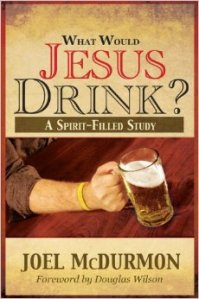 CJ Fast– You don’t know your Bible. He admitted it.
CJ Fast– You don’t know your Bible. He admitted it.
18 For John came neither eating nor drinking, and they say, ‘He has a demon.’ 19 The Son of Man came eating and drinking, and they say, ‘Look, a glutton and a winebibber, a friend of tax collectors and sinners!’
Mental gymnastics don’t cut it. It says what it says.
If the question is put “Why do you need to drink?”, a simple “Because I want to” will suffice, aside from the fact that need is not the issue.
The real issue is back to the authority and sufficiency of Scripture, that a Christian should not be like the Pharisee, by advancing unwritten laws on others, as the Pharisees did. Where God is silent, we must be silent. Sola Scriptura.
The silence of God stops the mouth. (Or at least of those who fear Him.)
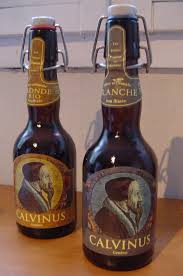 Troy– Look, if you want to drink, great…go for it. However, who do you think you are to berate those who choose not to? Go and drink in silence…and stop trying to convince others to join you….that my friend is a sin. It is directly contrary to the call of scripture. It is exactly what Paul was talking about when he talked about meat sacrificed to idols and how he would never eat meat if it would cause a brother to stumble. He said, if you are going to eat meat sacrificed to idols (in this case, if you are going to drink) then go ahead and do that, to the glory of God…but do not look down on your weaker brother’s whose faith will not allow them to eat.
Troy– Look, if you want to drink, great…go for it. However, who do you think you are to berate those who choose not to? Go and drink in silence…and stop trying to convince others to join you….that my friend is a sin. It is directly contrary to the call of scripture. It is exactly what Paul was talking about when he talked about meat sacrificed to idols and how he would never eat meat if it would cause a brother to stumble. He said, if you are going to eat meat sacrificed to idols (in this case, if you are going to drink) then go ahead and do that, to the glory of God…but do not look down on your weaker brother’s whose faith will not allow them to eat.
So again, eat, drink, be merry…but be quiet about it.
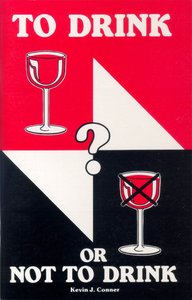 CJ Fast– Since when did I berate those who choose not to? Absentionism is a false teaching that needs to be dealt with in the body of Christ. All I said was that no one could convince me drinking is wrong. I’ve not tried to convince others to drink. I also don’t look down on any weaker brother who abstains. I am not against abstinence, only abstentionism.
CJ Fast– Since when did I berate those who choose not to? Absentionism is a false teaching that needs to be dealt with in the body of Christ. All I said was that no one could convince me drinking is wrong. I’ve not tried to convince others to drink. I also don’t look down on any weaker brother who abstains. I am not against abstinence, only abstentionism.
If others stopped making such an absurd suggestion, and stopped playing the Pharisee toward those who have no need to abstain, then there would be no issue, and no conflict. It is the abstentionists who are the trouble-makers. They turn Romans 14 into the tyranny of the weaker brother. You think you get to lord it over those who don’t abstain, and you want to prohibit us from drinking, or push us into the closet with a bottle, and make us feel like we’re sinning. That is just evil.
I will not be browbeaten by the abstentionist. As long as this false teaching is advanced, I will hold the bottle up high. Be silent when you see a brother and his drink, and I will be silent.
Chris– Only wrong if done to excess or if you know it will cause your brother who is convicted in his own walk with God that he shouldn’t drink and your drinking could cause him to stumble.
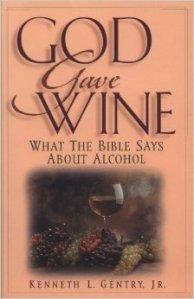 CJ Fast– I agree, Chris. It’s like my music. If I know my music bothers someone, I will turn it off. I would respect a brother by asking “Do you mind if I have a glass?” I would abstain in that situation.
CJ Fast– I agree, Chris. It’s like my music. If I know my music bothers someone, I will turn it off. I would respect a brother by asking “Do you mind if I have a glass?” I would abstain in that situation.
Unfortunately, abstentionists are not happy with this. They want that abstinence to be the rule. That is where they cross the line.
The abstainer just chooses not to drink. The moderationist has one glass, and quits. The abstentionist not only abstains as a rule of life, but wants everyone else to also. That is the heart of a Pharisee.
The bottom line is that the abstentionist does not have a case. They need to stop acting as if they do.
Chris– I stopped drinking after my wife and I separated. My son was my motivation. I still hold the belief there is nothing wrong with it.
Troy– Abstinence is NOT a false teaching. It is an opinion. “Drinking is a sin” is a false teaching. It is possible to to teach abstinence as a lifestyle without teaching falsely that drinking is a sin. Even Paul mentioned his preference for different type of abstinence and said that he wished all men were as he.
I teach abstinence because there is no actual reason to drink. I am very clear that it is not a sin unless you get drunk. It is just logical that if you never have a drink, you will never get drunk…and also, as a redeemed alcoholic I know the deceptive pull of alcohol. Further more, as one who has had to deal with the destruction of alcohol in other peoples lives, I just cannot see any reason to suggest that people should drink.
Honestly, I tell people if they want to drink, that is their choice, but it is dangerous. It is no different than the fact that I would love a motorcycle but my wife and my mother-in-law believe they are dangerous, and they are more dangerous than cars, so I choose not to.
Now, I will also say that your position could be sin as well. Depending on the reason. If the root cause of your desire to drink is rebellion (“you can’t tell me what to do”) then it is sin. If you simply enjoy a beer now and then, go forth and enjoy…but do not be an evangelist for it.
Interestingly, in an AG Forum, this article was posted tonight…
This article gives you something to think about. If you don’t agree with it, it is still something to consider…
Do We Have Room for Alcohol in the Assemblies of God?
Many are trying to decide whether or not we should loosen our stand against drinking alcohol, based solely on what the scripture says or doesn’t say. While I agree that the Bible is the ultimate rule for the lives of believers and is the best way to govern our societies, I also believe that there are things that are not covered in specificity but are covered by the law of sowing and reaping. While I can’t find a pure statement in the Bible that completely outlaws the consumption of alcohol I can say that the fruit of its use is a harvest no one wants.
The Centers for Disease Control and Prevention say that over 88,000 people die each year because of sickness or disease that can be directly related to the use of alcohol. The U.S. Library of Medicine says there are 1.2 million visits to local emergency rooms because of alcohol, creating 7,459 unintended deaths, 28,696 murders, 19,347 suicides, and 10,228 deaths involving automobiles, and all at a cost to the U.S. economy of $223,500,000,000.00. What can’t be reported or even tracked is how many kids are abused by drunken parents or guardians and how many homes and lives are destroyed because of alcohol use.
Why would we want to bring this evil into the lives of believers? Many have come to us to be delivered from it and its results. Have we forgotten the teaching of Paul that we should not do anything (even if it is not a sin) if it could offend our brother? This is not a “can we” issue; it is a “should we” issue!
It’s like the generation that built the barricade between their town and the river that ran beside them. They built it because it flooded and destroyed all they had spent their lives building. They said, “We can’t control the river and even though it’s nice to look at, it’s nice to have easy access to it, we never know when it’s going to flood. So let’s protect ourselves and our children by raising a standard so high that it can’t get to where we live.” Later, however, after that generation had passed away the children said, “What were our parents thinking? Why should we live behind such a high standard? If we take it down we will be able to see the beautiful river and enjoy all of its assets.” They did take it down and the river did flood, and they lost both what they and their parents had built!
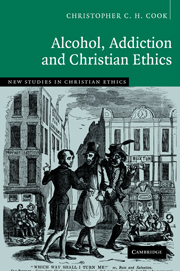
Alcohol, Addiction and Christian Ethics, by Christopher C. H. Cook, available from Cambridge University Press, and Amazon.
The generation who did not come directly out of a sin-ravaged situation but out of a Christ-blessed home may not value the high standards of the past generation as they should, but that does not change the law of sowing and reaping. What we sow or allowed to be sown will produce its fruit and if we lower our standards someone’s children will pay for it!
Just as alcohol impaired the thinking of Herod when he commanded the head of John the Baptist it continues to impair the thinking of people everywhere. It creates an atmosphere and opportunity for sin which ultimately produces death. Sin kills relationships, futures, and eternities. Why would we want anything in our lives that impairs our thinking and makes sin seem less deadly? The drinking of alcohol in itself may not be sin, but no one can deny that it creates an atmosphere for sin to operate.
As we consider this in the light of the law of sowing and reaping rather than simply as legal or illegal, we should look first at the fruit that comes from the activity, both good and bad, and take our stand either for or against, based on its potential results. This I know—once you plant the seed someone will have to deal with its fruit, and once you take down the standard someone will have to deal with the flood! It is not just, “Can I do it and still go to heaven?” It is also, “If I open this door will my grandchildren end up paying for it?”
So, in my opinion, we should not make room for drinking in the lives of the leaders or the culture of the Assemblies of God!
Pastor Rick Dubose
North Texas District Superintendent – Assemblies of God
CJ Fast– Doctrine must be based on Scripture alone. Never on experience. The pulpit is sacred and holy. Let it be filled only with God’s Word. Keep your experience-based opinions to yourself.
Troy– The logic you are using is the same logic that was used to tell people to stop trying to free the slaves. After all, the Bible never says “Do not own slaves” The Bible simply gives guidelines for how to treat a slave. So, by your (faulty) logic, we should go back to owning slaves.
The mistake you are making is that you are assuming that because the Bible does not explicitly say “No” it is therefore condoning whatever activity. However, whenever the Bible explicitly speaks of drinking, it is in a negative sense.
Proverbs 20:1 Wine is a mocker and strong drink is for fools and whoever is intoxicated by it is not wise.
Proverbs 23:20 Be not among winebibbers, among riotous eaters of flesh
Ephesians 5:18 But be not drunk with wine wherein is excess, but be filled with the Holy Spirit.
There is NEVER a positive account of drinking in the Bible. Look at Noah, or how David got Uriah drunk so he would sleep with his wife…we can throw out the account of Jesus making wine at the wedding because it is never explicitly stated that Jesus drank…and there are enough scholars who doubt that it was fermented wine.
So, based on that there is enough to teach don’t…but there is nothing to say “You should drink.”
Now, what you call humanism makes me think of a line from my favorite movie…”You keep using that word, I am not so sure it means what you think it means”. I believe you are trying to say that my thoughts are not Bible based…however, you would be incorrect. They are not in line with your interpretation…but the funny thing about that is…you could be wrong. I have shown you several places where the Bible speaks negatively towards drinking. Your only argument is that the Bible never says “No” to drinking. Sorry…not good enough.
CJ Fast– I’m surprised that you would be unable to preach against slavery from the Bible alone. It is not very difficult.
Jesus said He drank alcohol, as I quoted. That is good enough.
“There is NEVER a positive account of drinking in the Bible?” There’s the Lord’s supper, and the wedding, where He would not have made wine if He disapproved of the crowd. Not to mention numerous positive references. Also, the case of Noah is instructive. His drunkenness is condemned (also Lot), but there is no instance where possession of alcohol is condemned. Possession was obviously an accepted part of life, but never negatively referenced by the Lord.
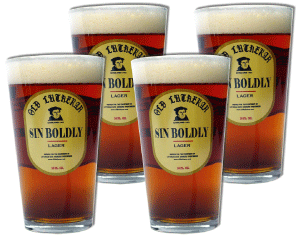 What is humanistic is appealing to experience to bolster an argument because the Bible doesn’t say what you wish it did. All premises must be found in Scripture, and all conclusions must follow from the premises. Experience and practical concerns about consequences are not valid premises for a conclusion about godliness or Christian living.
What is humanistic is appealing to experience to bolster an argument because the Bible doesn’t say what you wish it did. All premises must be found in Scripture, and all conclusions must follow from the premises. Experience and practical concerns about consequences are not valid premises for a conclusion about godliness or Christian living.
God really did give us all things that pertain to life and godliness, and He obviously didn’t give us anything in Scripture to build an abstentionist argument on, which is why abstentionists must always appeal to experience. This shows the epistemological bankruptcy of the argument. Reason enough to enjoy a beer while reading your Bible – and not in secret. Never mind that Martin Luther’s wife, Katharina von Bora, was a skilled brewstress, and Martin loved her beer. I’ll stick with Luther.
When I said ‘the Bible alone’, I really meant it. I do not deviate from that.
Appeals to experience – in any religious argument – get nothing from me but a kick in the balls.
Troy– And those instances need to be taken hand in hand with the other times when alcohol is mentioned negatively. And again, there is enough controversy surrounding whether or not the “fruit of the vine” mentioned at the wedding and in the Last Supper are actually fermented. There are some pretty renonwned scholars on both sides of the issue…
The Bible alone and you appeal to Luther’s wife? I thought you did not deviate?
All premises must be found in scripture…ok…so…I gave you several and you ignored them. Sorry pal…but you are not playing fair.
Finally, you keep talking about “abstentionism” which would be the practice of not voting…or the refusal of a government to participate in international relations or events that it considers against it’s own interest. Whoever coined the phrase needs to get themselves a dictionary. The correct term would be abstinence.
Your argument that “possession of alcohol” was obviously an accepted part of life, is exactly the same as the argument for slavery. You can say you could easily build a scriptural case against slavery yet, you are wrong. Possession of slaves was considered a normal part of life. That is why Paul gives instructions to both slaves and those who own slaves. That is why the Levitical Law had provisions for slavery. You can build a case against slavery from using ONLY the Bible…challenge given…prove it.
The only difference between alcohol and slavery is that slavery is so reprehensible.
 CJ Fast– Forget the scholars. It comes down to epistemology. Where does knowledge come from? How do you know? That is the central question for Christians, and resonates through Scripture – even for Elijah, when the mountains shook before his eyes. We have a recurring theme from Genesis to Revelation of trusting words instead of our senses. In Genesis 3:6 we see fruit that is desirable for knowledge and pleasant to the eyes (denoting sight or observation – knowledge through observation), and Thomas, who received knowledge of the risen Christ through sense experience – observation and touch.
CJ Fast– Forget the scholars. It comes down to epistemology. Where does knowledge come from? How do you know? That is the central question for Christians, and resonates through Scripture – even for Elijah, when the mountains shook before his eyes. We have a recurring theme from Genesis to Revelation of trusting words instead of our senses. In Genesis 3:6 we see fruit that is desirable for knowledge and pleasant to the eyes (denoting sight or observation – knowledge through observation), and Thomas, who received knowledge of the risen Christ through sense experience – observation and touch.
How many times did Thomas hear Jesus say He would rise again? Granted, all of the disciples were a little hard-headed, especially since the news came through a woman, but being brief, the disbelief of the others was overlooked. Thomas’ problem was not disbelief, but unbelief, as he confessed to the others. I’m skipping a lot of cases, but the point is that God looks unfavorably upon our reliance on sense experience for knowledge. There is also the well-known verse “Walk by faith, not by sight.” Faith here, is believing the WORDS that were said to you, and letting them eclipse what you see.
 The resounding theme in the volume of the Book is “Hear My words.” God is a God of words. The full gospel emphasis on experience is gross error.
The resounding theme in the volume of the Book is “Hear My words.” God is a God of words. The full gospel emphasis on experience is gross error.
So, now we have this modern problem of experience being a source of knowledge, and eclipsing the text – words – of Scripture.
This is the root of my hatred for abstentionism. It is not because I want to drink. I have never been drunk, or even close, in all my life. I grew up in a house with moderate drinking. No one was ever drunk in our home. My parents have never been drunk in their whole lives. We had wine, which was served to some guests for dinner, and was put away after all glasses were poured. That is how I was taught to drink, and have to this day.
Because of my absolute and utter hatred for pragmatism and empiricism, and my love for the literal words of Scripture, and dogmatism – the dogmatic use of the words of Scripture – I am a moderationist and will never tolerate abstentionism. Not for one second.
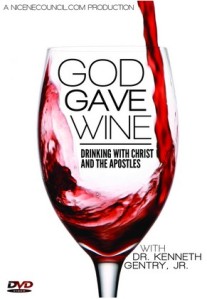 I wasn’t deviating. Luther’s wife is not part of my argument. I mention her in jest.
I wasn’t deviating. Luther’s wife is not part of my argument. I mention her in jest.
Abstinence – to avoid
Abstentionism – to counsel others to avoid
Biblically, there is a place for abstinence. Paul made that clear. But just as biblically, there is no place whatsoever for abstentionism, unless it is to your children, while living under your roof, or on a personal basis, to a person who should not be drinking.
To repeat that last part to each person you meet based on a speculation that ‘they might have the addictive gene, or might be weak, or prone to indulgence, etc.’ is totally sinful counsel.
Sean– There is a controversy about whether it was really wine and not fruit juice at the wedding in Cana and at Last Supper? News to me. And, must have been news to the guy in charge of the feast where Jesus performed his first miracle when he said; “Every man at the beginning doth set forth good wine; and when men have well drunk, then that which is worse: but thou hast kept the good wine until now.” I didn’t know people were that picky about grape juice. 🙂
Troy– Except that is not what abstentionism means. I gave you the dictionary meaning.
So, when Paul made the comment that he wished all were as he (unmarried and chaste) because marriage is an encumbrance that takes our eyes off God, he was wrong?
Paul’s letter to Philemon was not a treatise against slavery, it was an appeal for one slave to be freed. Never does Paul say that slavery should be ended. In fact, he tells slaves that get saved not to seek their freedom, just continue serving God in whatever place you are. Jesus never said anything against slavery. God gave laws regarding the treatment of slaves. Paul gave instructions to slaves and slave owners as to how they should act towards each other, never did he say they should be released. Peter also gave instructions regarding slaves and masters and how they should act towards each other and never did he say the slaves should be freed. Sorry, but by your logic, those who worked to end slavery were acting out of humanistic motivations and they were also acting contrary to scripture.
When I refer to scholars, I am referring to those who may know more than you and I regarding the culture and language of the time.
You can be reading the words but if your understanding of what the words mean is flawed, you are getting a flawed meaning (the prime example would be those that believe that 1 Cor 13 teaches that the gifts of the Holy Spirit will cease when the Bible is completed). It can be helpful to see what people who have made their life’s work studying and understanding these words in their original language…to not appeal to them is a form of arrogance I would prefer not participate in.
Sean, when it is all you have, you get a little picky about it…yes there is controversy. Even amongst those who lean towards abstinence, there is controversy. Some say it is unfermented and some say fermented.
For instance, Stanley Horton, one of the foremost AG scholars says it was likely unfermented while Menzies (I think) who is also a noted AG scholar says it was likely fermented.
Sean– Troy, I take it you’re not a fan of the idea that Scripture isn’t just those propositions explicitly delivered, but also includes everything that may be soundly inferred from them. And, 1 Cor 13 does teach that the miraculous gifts of the Spirit will end when the canon is complete.
CJ Fast– It is difficult to respond to a fragmented comprehension of Scripture. When you take little bits and pieces as proof-texts for this or that, without seeing thematics that we/others see, I don’t know what to say.
Troy– No it doesn’t and it cannot be teaching that…but that is a different conversation for a different time.
Actually I am a fan of that idea…it appears that CJ is not
CJ…they are Proverbs…and the theme is wisdom…come on
Sean– Oh, sorry, the “foremost AG scholar” is confused. I didn’t get that at first. Must have been at odds with some special revelation or “word of knowledge” he received. It’s funny that you can take a very narrow reading of Philemon and fail to see that the implications of the letter undermines the entire institution of slavery, but you’ll take the word of some “AG scholar” when the natural reading of Christ’s first miracle most certainly has to do with real wine.
CJ Fast– I think most of my posts have demonstrated an adherence to “the idea that Scripture isn’t just those propositions explicitly delivered, but also includes everything that may be soundly inferred from them.”
Sean– Yours have, but my question was directed to Troy. But, I guess if you’re AG you don’t need something as silly as sound arguments and necessary inference. I mean, who needs logic when you have the “spirit.”
CJ Fast– I knew you were referring to him. But he thinks he understands or practices that hermeneutic, but that I haven’t.
Sean– FWIW I wasn’t going to jump in at all (and probably shouldn’t have), but I never thought anyone was confused about what Jesus’ first miracle actually consisted of. I just never heard of weddings being celebrated with grape juice of varying quality. Is it like Welsh’s vs the store brand? But, then, I thought the argument would have been over when you cited Matthew 11:18,19.
 CJ Fast– It’s the same as an issue like evolution. The premises are not allowed to lead to a logical conclusion, if that conclusion is creation. Evolution is the teddy bear in the child’s arms. All premises and logical processes MUST lead to evolution (or abstention from alcohol). When a question arises which might lead to the taboo conclusion, dialogue is stopped, or the reasoning process must be steered – forcefully if need be – in the ‘proper’ direction. Unwelcome premises are discarded. If Sola Scriptura could lead to total abstinence, then it would be embraced. Since it never could, it must never be accepted. It is not evaluated on its own merits, but for where it will lead. The appeal to experience will live on as long as there is an affinity for abstentionism, since that is the only support available. If only they had a couple of verses to work with!
CJ Fast– It’s the same as an issue like evolution. The premises are not allowed to lead to a logical conclusion, if that conclusion is creation. Evolution is the teddy bear in the child’s arms. All premises and logical processes MUST lead to evolution (or abstention from alcohol). When a question arises which might lead to the taboo conclusion, dialogue is stopped, or the reasoning process must be steered – forcefully if need be – in the ‘proper’ direction. Unwelcome premises are discarded. If Sola Scriptura could lead to total abstinence, then it would be embraced. Since it never could, it must never be accepted. It is not evaluated on its own merits, but for where it will lead. The appeal to experience will live on as long as there is an affinity for abstentionism, since that is the only support available. If only they had a couple of verses to work with!
It’s quite an amazing psychology, really. The hidden incentives and aversions are fascinating to observe.
Troy– Sean, lets start here…you are not going to get anywhere with me by insulting me. I could just as easily make snide remarks about your ignorance of the full gospel, but I am not going to go there. Here is where I will go…
Please try to read more carefully. I was not actually putting forth the argument, I was stating that the logic that CJ was using was the same.
Now, as for Philemon, Paul made mention of “what you should do on your own” which we could take as a reference to freeing Onesimus. However, later, Paul also says that he is sending Onesimus back to Philemon and it was his choice whether he freed him or kept him as a slave, either way, he would be a dear brother.
Unless you are willing to apply the same line of reasoning to every similar situation in the Bible (the Bible never says no and even gives a few guidelines on how to) then you cannot apply them here.
CJ, your “reformed” bias is showing. To assume I have a fragmented comprehension of scripture is wrong. I am a firm believer in and a firm practices of getting everything in its context. The final context for every scripture verse is the entirity of the Bible. So, while I am trying to reconcile verses in Proverbs that seem to say it is stupid to drink with passages where Jesus turns water to wine…you are pretending the passages in Proverbs do not exist. I really like the analogy of evolution, but do you realize that YOU are doing exactly what you are claiming is wrong? You will not even pretend to deal with any evidence that could lead to a conclusion other than your own…
Sean– I’m not ignorant of the “full gospel” as I have attended “charismatic” churches for years. It is total bunk… and very dangerous too. But, I agree you weren’t putting forth an argument, because it seems you don’t have one supporting the idea that Jesus’ first miracle was turning water into fruit juice. As for Philemon, if you read the commentary CJ linked above, and I encourage you to do so, you’ll see that that little letter was in fact earth shattering and cuts to the heart of the slave issue.
Troy– Then you are ignorant enough to not realize that there are huge differences between “charismatic” and Pentecostal. For instance, I am an AG minister…and am not “bunk” or “dangerous” while I do agree that there are charismatic teachers out there who do indeed fit that description to think all or even most do is to be stupid.
The argument was never what Jesus did or did not turn the water into…I simply said I was not going to deal with that part because there is enough controversy.
And again…I am not arguing for slavery…it is a satirical slant on how the argument would have went back when the debate to end slavery was going on…but see you don’t know me or you would know that I fight against human trafficking and modern day slavery…so how about you bow out of this conversation because your obvious bias is showing…
Sean– I’m definitely biased, but I think you’re exaggerating the difference between Pentecostals and Charismatics especially when it comes to the question of cessationism. Further, there should be no controversy at all as to what Jesus’ first miracle was. The fact that you think there is or that there are legitimate objections to whether it was really wine is certainly a concern, particularly when coming from someone calling himself a minister. I know of no legitimate Christian denomination or theologian that would deny that Jesus turned water into wine. Anyway, I must be getting a “word of knowledge” because I can see this discussion is going nowhere.
“Wine” Means Wine, by Tim Gallant
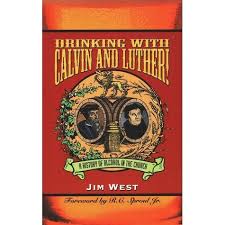 CJ Fast– There are warnings in Scripture about the use of alcohol, like the ones you’ve cited, but these are obviously not intended by the Author as premises toward a conclusion. They are nothing more than warnings within an overall context of endorsing alcohol in a believer’s life.
CJ Fast– There are warnings in Scripture about the use of alcohol, like the ones you’ve cited, but these are obviously not intended by the Author as premises toward a conclusion. They are nothing more than warnings within an overall context of endorsing alcohol in a believer’s life.
The unbeliever drinks to forget his sins.
The Christian drinks to remember that his sins are forgiven.
Also, I make no attempt to hide my Reformed bias. Such a bias is essential to a proper understanding of Scripture.
Troy– Unless of course, you are wrong…just a thought.
Sean, Charismatics like Rodney Howard Browne, Rick Joyner, Todd Bentley, etc., do not speak for all Pentecostals…they do not even speak for the majority of Pentecostals. Sorry you got caught up in a group that practices error, and were hurt by it. However, that is not Pentecost.
Do we all believe that the gifts of the Holy Spirit are still in operation today? Of course we do…but you do too and just don’t realize it. Any time you pray and ask God for some sort of miracle, you are proclaiming that the gifts of the Holy Spirit have not ceased. Read 1 Corinthians 12. Healing? Gift of the Spirit. Miracles? Gift of the Spirit. Understanding? Gift of the Spirit. They have either all ceased or none have.
CJ Really? “WIne is a mocker and strong drink is for fools”…that sounds like a premise towards a conclusion. I mean the passage does not go on to say “so drink in moderation”. The conclusion is pretty explicit…so stay away from it.
Now, maybe I need to clarify my stance a little bit. If I am preaching on a passage that deals with alcohol I will say that the Bible never explicitly says “Do not drink”. It says “Do not get drunk”. However, if you are asking my advice, I would say stay away from alcohol because the risk is much higher than the reward.
Matt– “You caused the grass to grow for the cattle,
and plants for man to cultivate,
that he may bring forth food from the earth,
and wine to gladden the heart of man,
oil to make his face shine,
and bread to strengthen man’s heart.” – Psalm 104:14-15 RSV
“Now the Spirit expressly says that in later times some will depart from the faith by giving heed to deceitful spirits and doctrines of demons, through the pretensions of liars whose consciences are seared, who forbid marriage and enjoin abstinence from foods which God created to be received with thanksgiving by those who believe and know the truth. For everything created by God is good, and nothing is to be rejected if it is received with thanksgiving; for then it is consecrated by the word of God and prayer.” – 1 Tim. 4:1-4 RSV
The teaching that drinking is a sin is legalistic and demonic.
Troy– Matt, we are so far beyond that…nobody (in this conversation) is saying drinking is a sin.
Matt– What do you use for communion?
Troy– Grape juice.
Matt– Upon what basis do you change the institution of our Lord?
Troy– The Assemblies of God does not hold that drinking is a sin if that is where you are going. However, as a denomination we have chosen a position of abstinence for those who hold credentials, so it would be kind of hard to use wine in Communion.
Matt– “He answered them, “And why do you transgress the commandment of God for the sake of your tradition?” Matthew 15:3
In all 4 accounts of the Words of Institution in Matthew, Mark, Luke and St. Paul, “the cup” means nothing other than wine. It is not to be grape juice. Grape juice was not even possible until Louise Pasture came along to discover the process of pasteurization. The term, “fruit of the vine” is a technical term which means simply, “wine.” It is akin to the phrase, “the twelve,” being a technical term for the apostles, not a numerical head count of those who had gathered.
It is a grave sin to break the express commandment of our Lord when He said, “this do.” Jesus commanded the use bread and wine in addition to the Words of Institution and the act of distribution. These two elements also are contained in his command, “do this” (Luke 22:19).
So I’d say what Paul said is also true of the AG.
“When you meet together, it is not the Lord’s supper that you eat.” – 1 Cor. 11:20
Troy– And you would be incorrect based on a legalistic stance. You are also wrong that unfermented grape juice was not possible. It was not only possible it was normative….what do you think wine is before it is fermented? Colored water?
To say that Jesus was saying it has to be fermented wine is a legalistic stance based on tradition…nothing more.
Sean– @Troy. I do think it is disingenuous to equate prayer and asking for God’s mercy in healing a sick love one with the miraculous works of the Spirit we see in passages like Acts 9:40 or “speaking in tongues” and special revelation. The Westminster Confession, which is the high water mark of Protestant confessionalism, has it right when it affirms: “those former ways of God’s revealing his will unto his people being now ceased.” It’s the claims to divine revelation that I find especially dangerous and completely without warrant and opens Christ’s sheep to all manner of deception while preventing them from resting on Scripture alone.
But, to end on a positive note (at least as far as I’m concerned), I couldn’t agree more when you said: “If I am preaching on a passage that deals with alcohol I will say that the Bible never explicitly says “Do not drink”. It says “Do not get drunk”. However, if you are asking my advice, I would say stay away from alcohol because the risk is much higher than the reward.”
Private communication with Sean
CJ Fast– Sean, you really agree with “if you are asking my advice, I would say stay away from alcohol because the risk is much higher than the reward”?
Sean– That’s his opinion and I can hardly fault him for it. Besides, it’s hard to argue. I like to drink. I love good beer and good scotch. I realize that the consumption of alcohol has a very definite downside well beyond just a hangover. For one, my daughter very nearly died in a drunk driving accident 3 years ago. She was 15 and was drinking with her boyfriend who just graduated HS that night. He was driving plastered and flying through our neighborhood with her in the car when he t-boned a tree.. Now she has a brain injury that will affect her the rest of her life. Alcohol does have a tendency to strip away inhibitions and the ability to reason clearly. That’s certainly a downside.
CJ Fast– I know I have to appreciate those things. I feel sorry for the loss you have to live with as well. I just think that can never enter the discussion on a theological level, or influence the conclusion. I know I can be hard-headed, and normal people can’t live up to my rigid standard of how to think correctly… but I can’t compromise. My last post says it straight.
Reading Clark helped me a lot. And made me harder to get along with.
Sean– I don’t have any issue with your theological point. I did have a problem with someone suggesting that Jesus didn’t really turn water into real good wine. That was just silly. Frankly, I also agree that wine only should be used in communion and the whole juice thing is just as silly.
CJ Fast– Yes. Troy should have ignored my post. I didn’t even think of him when I posted it. But that is the problem. Any time you say anything, that monster of humanistic reasoning is out there, and it will bite.
That shows a great need, and that’s why I said it. Not to bait him, but to show a presence of biblical reasoning that is obviously not allowed.
Sean, with regard to avoiding worldliness and falling into a trap of a bad habit, or ‘accidentally’ getting drunk, I think “stay away from alcohol because the risk is much higher than the reward” is an extreme stance. Unless of course, you are referring to a young person whose character is doubtful, or a type of person who you wouldn’t leave unattended with loved ones or valuable possessions.
For the life of me, I cannot comprehend having 3 or 4 drinks, anymore than “I’m bored. I think I’ll smash all my windows with a hammer.” LOL!
Seriously, they are on the same level to me. I hear guys at work talk about drinking excessively, and it goes way over my head, like “It’s the weekend! I’m going home to eat all my grass clippings!”
Maybe it’s because my mom gave me sips of wine when I was 10, and I hated it? I don’t know. Then they took me out for my 19th birthday, and said “Order whatever drink you want.” Not knowing anything about drinks, I ordered red wine, and again I hated it. (My mother could have done back flips, she could hardly contain her joy.)
I put a shot of C.C. in a glass of Coke, and I put the bottle away. Always have, always will. I’m 47. There are many sins I’m afraid of, given a weak moment. Over-drinking isn’t one of them.
I’m really not getting this.
For me the issue is not the alcohol, drinking or not. It is what is believed and said that is the problem. It could just as easily be guns. If a Christian said “You shouldn’t have a gun”, this discussion would be the same. My whole point is, do not say what Scripture doesn’t say! Biblical commands and injunctions go to this point.
HERE IS THE LINE.
DO NOT UNDER ANY CIRCUMSTANCES CROSS THIS LINE!!!
Past drunken episodes, tragedies, bad experiences, concerns about what could happen, etc. etc., notwithstanding.
The issue is theological. Experience must never contaminate the process of arriving at a theological position. Period.
All other considerations of potential pitfalls and tragedies (including Troy’s concerns) are secondary and strictly personal, and outside of the scope of this discussion.
Serving wine in communion would certainly be a bulwark to keep the issue in its proper perspective. I can imagine a God-fearing family participating in communion, drinking wine, but having no alcohol at home, and disapproving of drinking apart from the Lord’s table. That would be a refreshing sight. Of course, they would have no biblical basis for their position, but it would be a huge improvement over the current state of affairs. Such a family would be wiser to enjoy a glass of wine at the dinner table, and remember the Lord’s death in their prayer, not so much as a ministerial communion service, but as a family honoring the Lord and remembering the forgiveness of sin. I don’t know any such family.
In 200 years we have gotten so far off course. Thanks to the Wesleys and Azuza Street, this train is miles off the track, way off in the wilderness. It’s really sad. I would give up all the Charismata, every gift in 1 Corinthians 13, if cessationism were false, just to get back what we had in the 17th and 18th Centuries. Men once had to know logic and Greek before they could preach! No gift or miracle is worth what we’ve lost.
Sean– Look, I completely agree that wine and wine only should be used in communion. Wine conveys warmth and fellowship, something completely missing in grape juice. Troy is expressing an opinion, but he prefaced it by stating the bible doesn’t say don’t drink, but don’t get drunk. I think his opinion is valid one and it was a good note to end on … at least for me.
End of private communication with Sean
Troy– Sean, you don’t know me…but if you did you would know my stance on those things is the majority of the revelation we receive comes directly from studying scripture and the little bit that does not will be in line with scripture…those who hold “revelation knowledge” above scripture are wrong…always have been and always will be.
Sean– No, I don’t know you but I do know some things about the AG and it’s the little bit I object to. FWIW that’s what they always say that these new bits of propositional revelation will not contradict Scripture, but even something which doesn’t contradict and seemingly lines up with Scripture can still be false and often times is. Anyway, maybe we can save that discussion for another day. Peace.
Carrie– I believe that we need to be careful as believers with alcohol. We have the freedom to partake , but that may not be the wisest choice in certain situations. I had our kids memorize Galations 5: Now the works of the flesh are evident, which are: adultery,[a] fornication, uncleanness, lewdness, 20 idolatry, sorcery, hatred, contentions, jealousies, outbursts of wrath, selfish ambitions, dissensions, heresies, 21 envy, murders,[b] drunkenness, revelries and the like; of which I tell you beforehand, just as I also told you in time past, that those who practice such things will not inherit the kingdom of God.” They asked me about “revelries” and we looked it up. Basically, it means partying or in our vernacular, “clubbing”….being in the midst of drunken behavior. I believe it is an issue of separatism. I know Chris is known for his Christian testimony and he chooses to not engage in “partying” with his co-workers. The Lord speaks of ” do not love the world, nor the things that are in the world…” We are purist and believe that communion should be wine. We just need to be aware of our Christian testimony. As well, I believe that old saying “what parents do in moderation, kids will do in excess”. We need to be careful about setting a good example for our children as well. We just need to be wise with this issue. Carrie
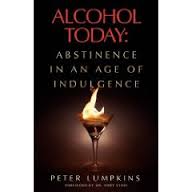 CJ Fast– I have been with Christians (my wife’s Christian friends from before marriage, and Christian in-laws) whom I thought were worldly in how they handled alcohol. They had unbelievers with us, and the whole group seemed worldly to me. Even if my wife were not there, I would have abstained (I did), because it seemed worldly to me. I have always believed that alcohol should be handled with graveness and sobriety in the heart. When I say sobriety, I don’t mean not getting drunk – though it does result in that – but the same kind of sobriety you have regarding your girlfriend when you are over at her parent’s house for dinner.
CJ Fast– I have been with Christians (my wife’s Christian friends from before marriage, and Christian in-laws) whom I thought were worldly in how they handled alcohol. They had unbelievers with us, and the whole group seemed worldly to me. Even if my wife were not there, I would have abstained (I did), because it seemed worldly to me. I have always believed that alcohol should be handled with graveness and sobriety in the heart. When I say sobriety, I don’t mean not getting drunk – though it does result in that – but the same kind of sobriety you have regarding your girlfriend when you are over at her parent’s house for dinner.
That is why the bottle is put away when a glass is poured. The world does not do that. Guys at work say “That bottle would be gone before lunch.”
Every time this issue is raised, it provokes doubt about the sufficiency and authority of Scripture. Past experience and concerns about potential pitfalls carry more weight. That is sad. That’s my whole point.
I was not directing my original post toward anyone. I did not have Troy in mind at all. Read my post about Thomas again. That is the whole issue. I think it is wrong for a Christian to have the same reaction toward the sight of a bottle of alcohol as toward a pornographic magazine. If you are at a brother’s house, and you see alcohol, and you ask ‘Why?’, you have a problem. That is my point.
1 Peter 5:8 (NKJV)
“Be sober, be vigilant; because[a] your adversary the devil walks about like a roaring lion, seeking whom he may devour.”
That is not saying “Don’t get drunk.” It is an attitude of mind. It means ‘don’t handle this lightly.’ Anyone who does not handle alcohol soberly is asking for trouble. I hope that I will always abstain from alcohol in the company of those who are not sober-minded. That is how we avoid worldliness.
I also think that a Christian at a social gathering who has one drink can be a greater witness for the Lord than one who abstains. When others see him take an hour to drink it, and observe his sobriety, that he is not like the others, and when he is done he has no more, that is not compromise. People will wonder why he is different. Every situation is different. We can’t judge black and white on that.
End of debate
While this debate was unfruitful as far as anyone being convinced of anything, I believe many of the statements made clarify the fundamental presuppositions that divide us. I think we covered 95% of this multi-faceted controversy. Much that was said here illustrates the character of the crisis of knowledge referred to in my introduction. At issue is How do we approach Scripture? How do we deduce from Scripture, and are we supposed to deduce from it? What is the Word of God? Is it only the text itself, or does the Word include logical deductions from it? Is the Word of God alone enough to govern Christian conduct, or are lessons learned from experience a necessary addendum? Does wisdom learned from experience become part of the Word of God for the church? Does William James have anything of value to offer the church in this regard?
I am convinced that God has the answers to these questions, and that He has expressed His will in the Scriptures. I further believe that this truth has been elucidated in print through the centuries by devout men of God, and that we can know these truths for ourselves. I also believe that these truths are an essential element of a healthy church life, and any church without them will suffer greatly. In the days ahead, with the grave threats we face, it is my prayer that our various churches will ignore the fluff that is so popular (like Rick Warren) and face these important questions fearlessly.
11 And He Himself gave some to be apostles, some prophets, some evangelists, and some pastors and teachers, 12 for the equipping of the saints for the work of ministry, for the edifying of the body of Christ, 13 till we all come to the unity of the faith and of the knowledge of the Son of God, to a perfect man, to the measure of the stature of the fullness of Christ; 14 that we should no longer be children, tossed to and fro and carried about with every wind of doctrine, by the trickery of men, in the cunning craftiness of deceitful plotting, 15 but, speaking the truth in love, may grow up in all things into Him who is the head—Christ— 16 from whom the whole body, joined and knit together by what every joint supplies, according to the effective working by which every part does its share, causes growth of the body for the edifying of itself in love.
Ephesians 4:11-16
Disclosure: Of the books pictured in this piece, I have read the following:
The Biblical Doctrine of Man, by Gordon H. Clark
To Drink or Not to Drink, by Kevin Conner
God Gave Wine, by Kenneth Gentry
Slavery and Christianity, by John W. Robbins
Full Gospel, Fractured Minds, by Rick Nanez
Drinking With Calvin and Luther, by Jim West
and Fit Bodies, Fat Minds, by Os Guinness
I have included images of books with which I disagree in this piece in the interest of fairness to the opposition. Dr. Samuele Bacchiocchi, in Wine in the Bible, teaches that there was unfermented wine in the Bible, and that only that wine is referenced in a positive context. Dr. Bacchiocchi is an abstentionist (not just an abstainer). I am a moderationist, and I favor the views of Dr. Kenneth Gentry, Jim West, Douglas Wilson, R.C. Sproul, R.C. Sproul Jr., and Martin Luther.
As a member of a full gospel church for 29 years, as well as a close observer of the full gospel movement in general, I have never observed my opponents display the open-mindedness and fairness I have demonstrated in this piece. The approach modelled to me by leaders I am familiar with is to be one-sided and close-minded. To follow their example, I should only include images of the books I agree with, and I certainly would not have included the letter by Pastor Rick Dubose. I hope I never display that kind of arrogance. I hope you read Gentry’s book. And I hope you read Bacchiocchi’s book.
I also hope you plainly see the foolishness of the abstentionist viewpoint.
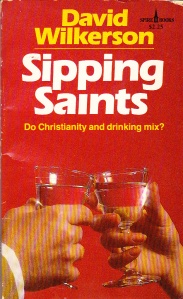

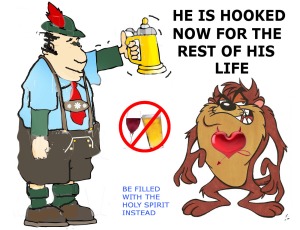

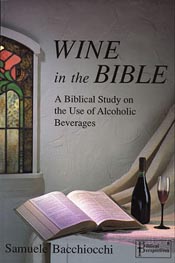
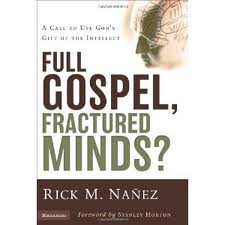
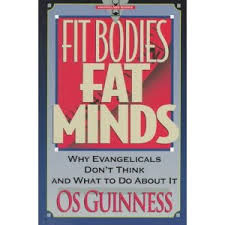

Tell me what you think